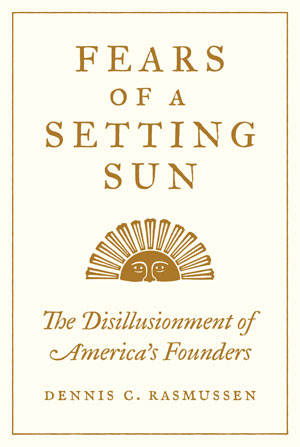
Fears of a Setting Sun tells the story of how most of the American founders came to feel deep anxiety, disappointment, and even despair about the government and the nation that they had helped to create. The title alludes to a quip from Benjamin Franklin on the last day of the Constitutional Convention. As the last of the framers affixed their names to the Constitution, Franklin called attention to the high-backed mahogany chair that the president of the Convention, George Washington, had occupied at the head of the room all summer; it had a decorative half-sunburst carved into the crest. He remarked that painters often found it difficult to differentiate, in their compositions, a rising sun from a setting sun. “I have,” he said, “often and often, in the course of the session, and the vicissitudes of my hopes and fears as to its issue, looked at that [sun on the chair] behind the President, without being able to tell whether it was rising or setting: but now at length, I have the happiness to know, that it is a rising and not a setting sun.”
This anecdote is often taken to be emblematic of the optimism that the founders felt at the new government’s birth. But my book shows that almost none of them carried that sense of hope to their graves. Franklin survived to see the government formed by the Constitution in action for only a single year, but most of the founders who lived into the nineteenth century—or even to the dawn of the new century, like Washington—eventually grew disillusioned with what they had wrought.
The book focuses principally on four of the preeminent figures of the period: George Washington, Alexander Hamilton, John Adams, and Thomas Jefferson. These four lost their faith in the American experiment at different times and for different reasons, and each has his own unique story. In a nutshell, Washington became disillusioned above all because of the rise of parties and partisanship, Hamilton because he felt that the federal government was not sufficiently vigorous or energetic, Adams because he believed that the American people lacked the requisite civic virtue for republican government, and Jefferson because of sectional divisions that were laid bare by conflict over the spread of slavery.
Like many Americans, I have long enjoyed reading popular biographies of the founders—the kind that academic historians sometimes deride as “founders chic.” Until fairly recently my own research centered on the Scottish and French Enlightenments—Adam Smith, David Hume, Jean-Jacques Rousseau, Montesquieu, Voltaire—so these books on the founders mostly served as a pleasant diversion. It often struck me, however, that while the stories were generally meant to be inspiring and uplifting, the endings were never entirely happy. Again, almost all of the leading founders ended up being, for one reason or another, rather disappointed in the government and the nation that they had helped to create. This seemed like a point worth pursuing, and I was surprised to find that no one had done so in a systematic way. For all of the tremendous amount that has been written on the founders, I was unable to find a single book, article, or even book chapter that takes the disillusionment of the founders as its theme.
Scholars and lay readers alike tend to focus on the founders’ “heroic” deeds during the founding period itself. There are perfectly good reasons for the emphasis on this period: this was, after all, when the country achieved its independence and when the charter by which we still live was devised and ratified. Still, it is important to remember that the founders’ thinking about politics did not somehow terminate with the ratification of the Constitution in 1788 or the Bill of Rights in 1791. Their views of the pitfalls and possibilities of republican government continued to develop over the succeeding decades, shaped by the struggles and successes of the constitutional order that they had created.
Given our continued attraction to the founders—our perpetual efforts to recover their ideas and renew their ideals—it seems sensible to try to achieve the fullest possible understanding of their outlooks, rather than confining ourselves to a snapshot taken at one moment in time. While their views during the founding period are eminently worthy of our attention, so too are their views in the succeeding years, which were, after all, shaped by greater real-world experience. I hope that my book’s focus on these years—roughly from the 1790s to the 1820s—helps to shed a different light on the founders’ outlooks.
One of the highlights of the book, I think, comes in the chapter on Jefferson and slavery. The Missouri crisis of 1819-21, which revolved around whether Missouri would be admitted to the union as a free state or a slave state, provoked from Jefferson an unforgettable expression of regret: “I am now to die in the belief that the useless sacrifice of themselves by the generation of ’76 to acquire self-government and happiness to their country is to be thrown away by the unwise and unworthy passions of their sons, and that my only consolation is to be that I live not to weep over it.” This line is all the more striking because it came from a figure who had long been one of the most optimistic of the founders.
Though he was a major slaveholder himself, Jefferson fought a reasonably forceful battle against the institution early in his career, at least in the political realm. He tried to include a harsh denunciation of slavery in the Declaration of Independence; he drew up statutes that would have gradually abolished slavery in his home state of Virginia; and he helped to draft a bill that would have banned slavery from any of the nation’s western territories. Alas, his efforts to combat slavery—however qualified and ultimately futile—all but ceased after the 1780s.
In fact, by the end of his life Jefferson actively supported the expansion of slavery into new territory. His belief, at that point, was that the expansion of slavery would not lead to an increase in the number of enslaved people, only to their being more spread out, and that if there were more slaveholders in more places, then the institution would be easier to eradicate because each individual slaveholder would keep fewer people in bondage and so have less to lose from emancipation. It was, of course, manifestly delusional to think that the demise of slavery could be brought about by giving it free rein—by making the problem more national rather than narrowly sectional in scope. This delusion led to one of the more biting lines of the book: “Jefferson had done almost nothing to combat slavery since the 1780s, but what he did during the Missouri crisis was much worse than nothing: he lent his powerful name to the forces seeking to expand slavery. He still considered himself to be an opponent of the institution, but by this point one might fairly say that with enemies like Jefferson, slavery hardly needed friends.”
The most notable founder who did not come to despair for his country—the proverbial exception that proves the rule—was the one who outlived them all, James Madison. The book devotes a pair of chapters to exploring why Madison retained his faith in America’s constitutional experiment when so many of his compatriots did not. There were a variety of reasons for Madison’s continued confidence, but one of them was precisely that he had lived so long and seen so much in company with the nation that he had helped to found. Madison reasoned that if the Constitution and the union managed to survive the Alien and Sedition Acts of 1798 (a harsh crackdown on civil liberties spurred by war hysteria), the War of 1812 (during which much of the capital went up in flames under Madison’s own watch), and the Missouri crisis of 1819-21 (the biggest confrontation yet over the nation’s most divisive issue, the expansion of slavery), then surely it could withstand a good deal more. The longer the nation endured, the more durable it seemed.
If Madison could find solace in the fact that America’s constitutional order had managed to weather nearly a half-century’s worth of storms by the time he reached old age, then perhaps we should be cheered to recall that it has now survived for more than two hundred and thirty years. We might also take a certain comfort in the fact that, however appalling the state of American politics might be at the moment, the political situation was even worse when the founders whom we so admire presided over the nation.
Most obviously, we no longer countenance widespread chattel slavery or the routine dispossession and even massacre of indigenous tribes; on the contrary, basic civil and political liberties have never been extended to more people. Political violence is far less common today, the recent attack on the Capitol notwithstanding; the nation’s first decade saw thousands of armed citizens march on an army outpost in rebellion against a tax at one point, and legislators brawl on the floor of the House of Representatives with canes and fire pokers at another. The ugliness of the last presidential election pales in comparison to that of the election of 1800—a contest between Jefferson and Adams, two of our most revered founders. Today’s much-maligned “mainstream media” is in reality far more responsible and fact-based than the newspapers of the 1790s. And so on.
None of this is grounds for complacency. Today’s political ills are both serious and pressing, as Washington, Hamilton, Adams, and Jefferson would surely remind us. Madison, though, would encourage us to summon a broader sense of perspective before announcing the doom of the republic.


Dennis C. Rasmussen is professor of political science at Syracuse University’s Maxwell School of Citizenship and Public Affairs. His other books include The Infidel and the Professor: David Hume, Adam Smith, and the Friendship That Shaped Modern Thought (Princeton University Press, 2017), which was shortlisted for the Ralph Waldo Emerson Award.